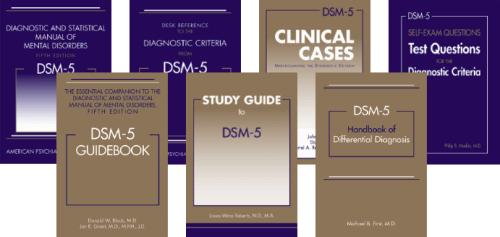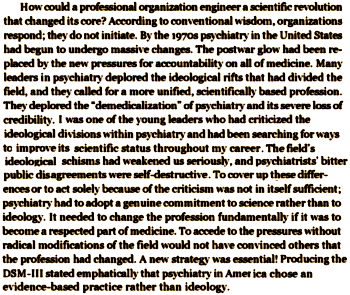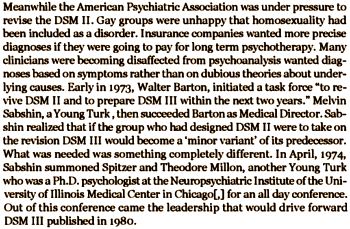
[the flyer]
At the top of the flyer, it says "Coming in 2013," and down at the bottom next to the APPI logo, it says, "The First and Last Word in Psychiatry." On a lark, I went looking for when the American Psychiatric Publishing was founded. It was 1981, the year after the DSM-III came out – probably in response to the DSM-III’s publication. So much for the "First … Word in Psychiatry." I guess that’s the way a lot of people think about things, that psychiatry proper came into being in 1980, or at least was born again.


I haven’t been a member of the APA in decades. It wasn’t a dramatic stand based on conviction. It was my wife who pays the bills saying, "Do you want to renew your membership in the APA?" some time in ancient history, and I responded, "I forgot I was a member." She took care of it from there. And I don’t think I know anyone who is a member, at least not anyone I know very well. But I’m now finally coming to my point. On one level, I see that flyer up there as the heir to Dr.Sabshin’s legacy of an APA power base. Unlike this country’s founders who followed up their "when in the course of human events…" statement with a system that encouraged debate and dissent, revolution leading to evolution, we were left with a unitary and static organization running under its own banner. I guess I now see it as concerned with itself and commercial interests rather than the gathering place representing the members of a medical specialty.
Were I reading this, I would be wondering how much of what this guy is saying has to do with his own story and his choices along the way. I wonder that too, even as the guy. But I know that what I hoped for as this DSM-5 progressed was some change in the trajectory of the APA. This Task Force did not set out to revise the DSM-IV to fix some of its failings or eliminate some of its errors. It set out to do something new, to institutionalize a paradigm shift to the neuroscience agenda that has dominated the field since the early days following the 1980 DSM-III’s publication. That goal eluded them, but also accounted for some of the widespread opposition. I think what I hoped for was that they could do what I think Drs. Sabshin and Spitzer thought they were doing in the first place – removing an ideological, profession-specific, or treatment-directed agenda from the diagnostic code book. For example, I wanted them to do something about the depression diagnoses that would make the clinical trials actually meaningful, instead of a turkey shoot at a symptom. I think I hoped in light of the scandals and rampant conflict of interest problems in psychiatry that they might be able to do something to get us back on track. Maybe I even hoped that the APA might find a way in the process to become more right-sized, more able to contain and address the crisis of integrity that discolors psychiatry right now. Those were apparently unrealistic hopes.
 Will this DSM-5 be the APA’s "Last Word in Psychiatry" [Last, as in final]? Who knows? My best guess is that mental health at large will move to the International Classification of Disease [ICD] code book. We’re really already there by treaty. Maybe the APA can bring off extending the DSM’s reign by inertia, though I think even at that the best they can realistically hope for is selling the spiral-bound DSM-5 Desk Reference to be used as a simple code book. The only thing they can do now about the Field Trials is hope that most people don’t know what they are and about their nuclear place as the scientific basis for the manual. We certainly owe a debt of gratitude to Drs. Spitzer and Frances for their efforts in trying to help the DSM-5 Task Force change the direction of things – and particularly Dr. Francis for what didn’t make it into the final version. But now, "a card laid is a card played" as they say in serious Bridge, so we’ll see if they make their contract, or go down…
Will this DSM-5 be the APA’s "Last Word in Psychiatry" [Last, as in final]? Who knows? My best guess is that mental health at large will move to the International Classification of Disease [ICD] code book. We’re really already there by treaty. Maybe the APA can bring off extending the DSM’s reign by inertia, though I think even at that the best they can realistically hope for is selling the spiral-bound DSM-5 Desk Reference to be used as a simple code book. The only thing they can do now about the Field Trials is hope that most people don’t know what they are and about their nuclear place as the scientific basis for the manual. We certainly owe a debt of gratitude to Drs. Spitzer and Frances for their efforts in trying to help the DSM-5 Task Force change the direction of things – and particularly Dr. Francis for what didn’t make it into the final version. But now, "a card laid is a card played" as they say in serious Bridge, so we’ll see if they make their contract, or go down… 
Sorry, the comment form is closed at this time.